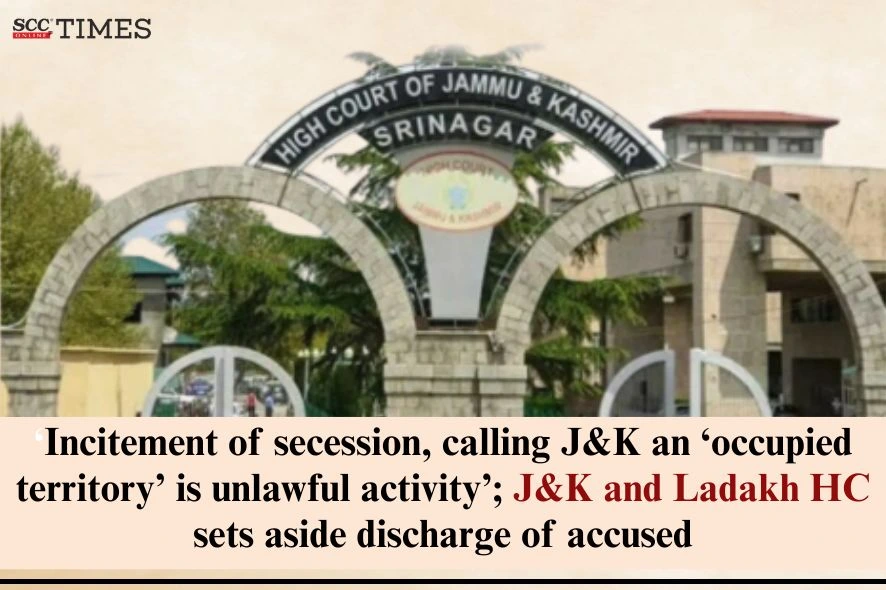Jammu & Kashmir and Ladakh High Court: The present appeal was filed by the appellant against the order of the Additional Sessions Judge (‘Trial Court’), wherein the respondents, who were facing prosecution under Section 13 of the Unlawful Activities (Prevention) Act, 1967 (‘UAPA’) for delivering anti-national speech and calling for secession of Jammu and Kashmir claiming that it was illegally occupied, stood discharged. The Division Bench of Sanjeev Kumar and Sanjay Parihar*, JJ., set aside the discharge and held that it was legally unsustainable and reflected a ‘non-application of mind and erroneous application of law’.
Background:
On 20-3-2015, the respondents allegedly delivered a speech to public that had gathered to offer Friday prayers, with the intention to instigate them against sovereignty of India and to call for separation of the then State of Jammu and Kashmir from the rest of India calling it an illegally ‘occupied territory’. They were challaned for an offence under Section 13 of the UAPA, as there was substantial evidence against them, for which they were arrested and later released on bail. After investigation, the case was closed as challan and sent for sanction, which was received from the competent authority, directing production of charge-sheet against the respondents, who by that time had turned absconder. Upon filing the charge-sheet, both the respondents were arrested.
On 29-9-2021, the Trial Court dismissed the charge-sheet and held that since there was no law-and-order problem caused pursuant to the raising of anti-national slogans, there was no material to warrant their involvement in an unlawful activity. The Trial Court observed that an offence under Section 13 of the UAPA was not made out placing reliance on the Supreme Court’s decision in Balwant Singh v. State of Punjab, (1995) 3 SCC 214.
The appellant contended that the Trial Court had resorted to conducting enquiry at the charge stage and sifted the evidence as if it was finally deciding the challan, thereby discharging the accused without properly examining the contents of the charge which resulted in grave miscarriage of justice. The respondents did not appear despite service, and they were also absent from the previous hearing.
Analysis and Decision:
The Court after analysing the definition of ‘unlawful activity’ provided under Section 2(o) of the UAPA, noted that the respondents were not related to any unlawful association or banned organization and were only acting in their individual capacity when they were allegedly inciting the general public to initiate struggle for achieving the objective of separating Jammu & Kashmir from the Indian Dominion.
The Court referred to Union of India v. Prafulla Kumar Samal, (1979) 3 SCC 4, and State of Bihar v. Ramesh Singh, (1977) 4 SCC 39, wherein it was held that if there was a strong suspicion which lead the Court to presume that the accused had committed an offence, then it was not open to the Court to say that there was insufficient ground to proceed against the accused.
The Court cited M.E. Shivalingamurthy v. CBI, (2020) 2 SCC 768, wherein it was observed that the accused was entitled to discharge only if the statements recorded under Section 161 of the Criminal Procedure Code, 1973 (‘CrPC’), which the prosecution proposed to adduce to prove the guilt of the accused, could not show that the accused had committed an offence. It was further opined that where there were two views, one giving rise to mere suspicion and the other to grave suspicion, the Judge would be justified in refusing discharge if satisfied that strong suspicion exists. The existence of some essential material that gave rise to strong suspicion was necessary for drawing a charge and refusing discharge.
The Court observed that the accusations along with the statements of the witnesses under Section 161 CrPC, brought the case within the ambit of ‘unlawful activity’ as defined in the UAPA because the respondents were advocating and inciting the commission of an unlawful activity by asserting that Jammu & Kashmir was illegally occupied and must be separated from the Indian Union, thereby advocating secession.
The Court opined that the Trial Court’s reliance on Balwant Rai (supra), was uncalled for because in that case the accused had raised slogans in a crowded place after the assassination of the then Prime Minister but in the present case the matter was still at its infancy and the prosecution was yet to adduce evidence in support of the accusations raised under Section 13 of the UAPA.
Consequently, the Court set aside the Trial Court’s order and held that it was unsustainable as it suffered from non-application of mind and erroneous application of law. The Court, while restoring the charge-sheet, directed the Trial Court to proceed with framing of charge against the respondents for the offence under Section 13 of the UAPA.
[State (UT of J&K) v. Ameer Hamza Shah, 2025 SCC OnLine J&K 745, decided on 18-7-2025]
*Judgment authored by: Justice Sanjay Parihar
Advocates who appeared in this case:
For the Appellant: Maha Majeed, Assisting Counsel vice Faheem Shah, GA.



